 It's a not-so-secret fact that Halloween is Sara Dobie Bauer's favorite day of the year. Follow her Twitter or Facebook page, and you'll be treated to photos from her Goth-chic modeling sessions, horror movie gifs, and plentiful vampire references. (In between all the pictures of Benedict Cumberbatch, of course.) We released her novel BITE SOMEBODY in the summer because it makes a perfect beach read, but it makes a perfect Halloween read as well. And because Sara loves Halloween so much, she wanted to offer all of you a special Halloween gift: a sneak peak into the sequel, BITE SOMEBODY ELSE, which will be released in summer 2017. While BITE SOMEBODY was told through the point of view of Celia, the awkward newbie vampire, BITE SOMEBODY ELSE is all about Imogene, Celia's purple-haired eighties punk rocker sidekick. Here you go: have a bite. Excerpt from BITE SOMEBODY ELSE by Sara Dobie Bauer. All rights reserved. They never met at The Columbia. It was way too posh for the likes of Imogene and Celia, so she was surprised when Celia suggested they meet there for drinks. Whenever Imogene made her way to St. Arthur’s Circle on Admiral Key, she usually opted for cheap frozen beverages at The Daiquiri Deck, where they served drinks with names like “Call a Cab” and “Blotto.” As expected, the restaurant was crowded, it being peak tourist season in Florida. She ducked and wove around people to try and spot Celia’s bright red hair but thought maybe she’d beat her friend to The Columbia, which never happened since Imogene was always late. She didn’t see Celia, but she hid behind a waiter in a crisp, white shirt when she spotted the back of a familiar head. Nicholas. He sat at a table set for two with a sketchbook in front of him. She suspected the “painter” of Dr. Savage’s nude was Nicholas, which was why Dean had been all in a huff the other night. When the waiter—her shield—moved on to another table, Imogene ducked behind a potted palm and watched Nicholas, pencil in hand. She got a quick glimpse of what he was drawing and made a sound like, “Huh?” It was quite obviously a drawing of her. Well, her wild hair at least, with the beginnings of her prominent cheekbones. She stood up straight, hands on her hips, until a waiter asked, loudly, “Ma’am, can I help you?” Nicholas glanced over his shoulder, recognized her, slammed the sketchbook shut, and shoved it into the back pocket of his navy blue trousers. Cover now blown, she walked up to his table. “Hey.” He stood and ran a hand through his short, auburn hair. “Miss … Imogene.” His dark suit coat was over the back of the chair. He wore a light blue striped dress shirt, rolled up at the sleeves, and a navy blue vest. In the gentle glow of St. Arthur’s street lamps, his multi-colored eyes shined a shade of sea green. It took every damn bit of her resolve to not lean forward and sniff him, because even from two feet away, that toe-curling smell was back: basil and peppermint with a dash of pepper. She pulled her sunglasses down over her eyes. “Uh, what are you doing here?” “I’m meeting Ian.” “Here?” He nodded. “I’m supposed to be meeting Celia.” She crossed her arms and sighed. Nicholas seemed to understand the same time she did. His forehead crinkled. “They set us up,” she said. “Indeed.” He looked down at his shiny brown shoes. “I owe you an apology.” She pursed her lips. “It was very rude of me to speak as I did the other night. You’re right, I am a cold fish. I am now, at least, and I—” “You’re not a cold fish.” She chewed on one of her fingernails. “You painted that nude of Dr. Savage. You must be kind of kinky.” He snorted and did something like a smile—an amused lift of his upper lip. Then, he looked down at the candlelit table. “We both drove here. Might as well have a drink. Join me?” She wanted to ask why he was drawing a picture of her in his sketchbook, but instead, she said, “Fuck it,” and sat. “You’re very fond of that word.” “I don’t know what the fuck you’re talking about.” She smirked.
1 Comment
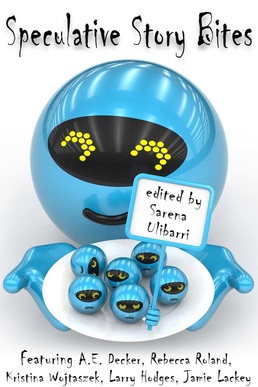 "Three Grams" by Jamie Lackey is original fiction from the anthology Speculative Story Bites. Get the whole anthology from Amazon, Kobo, or World Weaver Press. When Alicia opened her eyes, everything looked different. Colors were strange—sharper and brighter than they had been before—and she could see tiny details that she’d never noticed. “Honey?” She turned her head, and saw her father’s thin lips moving. She could count the fine hairs on his forehead. His voice sounded different, too. “How’re you feeling?” She sat up, moving carefully. The familiar pain didn’t shoot through her. Of course it didn’t—she wasn’t in her old, broken body anymore. Her father had saved her, just like he’d promised to. “I feel great, Daddy.” He grinned and hugged her. His body was warmer and softer than she remembered. “Let’s go see your mother.” Her mother’s smile was strained. “Is it really her?” her mother whispered in her father’s ear, in a voice that would have been too quiet for Alicia to hear in her former body. “The three grams that you were so worried about transferred into the new body with her memories,” he whispered back. Her mother knelt beside her and hugged her, but only for a second. She pressed a distracted kiss to Alicia’s hair, then walked past her, into her father’s laboratory, where the broken, dead body that had been her prison lay strapped to a table. Alicia could hear her crying. Anger surged through her, and her hands clenched into fists. How could her mother be upset? Alicia was still alive. And she wasn’t in pain anymore. Her mother should be happy. “Why isn’t she happy?” Alicia asked. “Your mother is just confused, honey,” her father said, pushing his glasses up his thin nose. “It’s going to take her some time to get used to the idea of you being better.” Alicia stomped her foot. “She’s being selfish.” “She just needs time.” *** Alicia wandered around the garden. Her parents were fighting inside. About her, again. Her mother didn’t know that she could hear every time she called her a monster—each time she screamed about how Alicia was a Frankenstein creature, not human, not the child she had carried in her womb. Alicia tried to listen to the friendlier sounds in the garden. The bees buzzed, the birds sang, the wind chimes rang. It was a beautiful day. In her old body, she would have been too hot, but now she hardly noticed. The roses had just started blooming. She’d helped her mother plant the roses two years ago. Alicia had insisted that they plant red ones. She loved red. They’d laughed and thrown mud at each other while they planted them. It had been a good day. How could her mother not believe that she was real? Alicia knew about the three grams that her father mentioned—according to her mother, that’s what the soul weighed. Alicia had her memories and her soul. Her new body looked just like her old one had. Daddy even said that she’d grow up just like normal. All that she didn’t have was the pain. Had that been what her mother loved? Alicia’s anger bubbled up through her, and she punched the closest tree. Bark crunched beneath her knuckles. She pulled her hand back and examined it. She was completely undamaged. She looked at the tree. Green sap oozed out of the dented trunk. She knew she should feel bad about hurting the tree. It hadn’t done anything wrong. But she didn’t feel bad. She didn’t feel anything except anger. What if her mother was right? *** 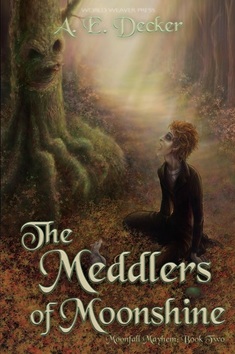 Guest post by A.E. Decker The first draft of The Meddlers of Moonshine took me thirty days to write, and turned out to be over a hundred thousand words long. Hey, there was chocolate on the line. A few writer friends and I were holding our own personal NaNoWriMo to see who could get the most words on page in a month. That was two years ago, now. At that point, I’d sent The Falling of the Moon to World Weaver Press, but hadn’t heard a definite reply. I was simply writing the next book in what would become the Moonfall Mayhem series because I knew this world had more stories to tell. And because, again, there was chocolate on the line. Which I won — you don’t get between me and chocolate. I wish I’d saved that first draft in its entirety to see how much of it ended up in the version of Meddlers that has just been published by World Weaver Press. I remember some things that were lost, such as a strange clock tower with a spooky bell that rang whenever someone lied. (I think Catch broke it by page nine.) I also toyed with spoofing detective novels — I’m a diehard Sherlock Holmes fan — but the plot thread got too complicated and had to be snipped. I change or delete whole paragraphs when I redraft, so unlike many authors, I don’t end up with deleted scenes to treat my readers with. So, what did remain, when I was done snipping and editing? Plenty of mystery. A spooky, run-down chateau, and a mad scientist’s—or, rather, alchemist’s—lair at the top of an old tower. A glowing black dog ripped straight from the pages of The Hound of the Baskervilles (See? I got in a Holmes reference after all!), and a ghost boy only Rags-n-Bones can see. Plus, as readers of my earlier blog might remember, Meddlers owes much to Henry James’ The Turn of the Screw. Some authors write from one big idea. I feel more as if I collect a hundred dust motes and roll them into one great ball of ideas. The pleasure — and trouble — for me involves putting together the many diverse plot threads and making them work. I hope it’s enjoyable to read, too. The Meddlers of Moonshine is as much Rags-n-Bones’ story as it is a continuation of Ascot’s from The Falling of the Moon. Unlike the first book, Meddlers is split between their perspectives. Getting into Rags-n-Bones’ head was surprisingly easy. He is such a sweet, earnest, straightforward person that his sections of the book, frankly, became easier to write than Ascot’s. It took me a while to figure out exactly how she was going to deal with a certain fellow clad in black leather...but you’re going to have to read the book to find out who I’m referring to. 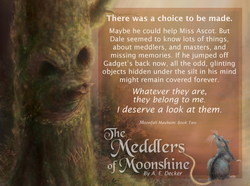 The most difficult part was getting the title right. All of the titles involve “moon” somewhere, and I liked “moonshine” for Rags-n-Bones, but finding something appropriate and memorable didn’t happen until I began the second draft a year ago. (The second draft, incidentally, took far longer than thirty days to complete!) I wish I recalled the “aha!” moment when I came up with “Meddlers,” but it’s gone from my memory. However it happened, once I had the title, and the idea of the secret, titular group, all the plot threads began knotting themselves together — leaving just enough dangling to pull you into the next book, of course. The next book? Yes, while you’re (hopefully) snuggling up with a cat, a cup of cocoa, and a copy of The Meddlers of Moonshine, I’m busy at work on book three, Into the Moonless Night. This one will feature Catch as co-protagonist, and all I can tell you at this stage is that his mind is a lot twistier than Rags-n-Bones’. Into the Moonless Night will spoof Tolkien, The Hunger Games, and the whole “chosen one” trope as Ascot and company travel into the dark heart of the Clawcrag mountain range to confront the return of a prophesied evil. Of course, nothing will go as expected. It wouldn’t be amusing if it did, would it? I hope you’ll be eager to continue Ascot’s journey Into the Moonless Night. By the time you’re reading that one, I’ll probably be working on book four! But let’s not get ahead of ourselves. For now, curl up and enjoy The Meddlers of Moonshine, set in the brisk little steampunk town of Widget, situated in Moonlight Valley. Keep an apple on hand for the local ghost. 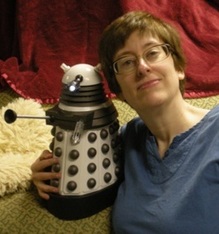 A. E. Decker hails from Pennsylvania. A former doll-maker and ESL tutor, she earned a master’s degree in history, where she developed a love of turning old stories upside-down to see what fell out of them. This led in turn to the writing of her YA novel, The Falling of the Moon. A graduate of Odyssey 2011, her short fiction has appeared in such venues as Beneath Ceaseless Skies, Fireside Magazine, and in World Weaver Press’s own Specter Spectacular. Like all writers, she is owned by three cats. Come visit her, her cats, and her fur Daleks at wordsmeetworld.com. 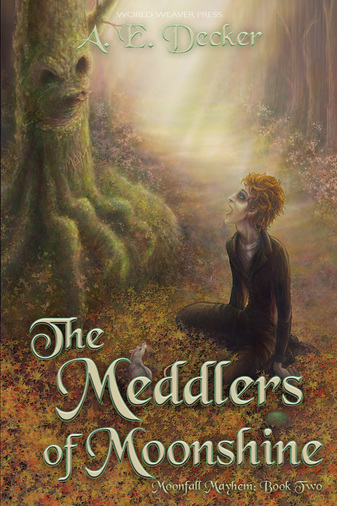 The second book in A.E. Decker's Moonfall Mayhem series has arrived! While the first book, The Falling of the Moon, played with fairy tale tropes, The Meddlers of Moonshine plays on Gothic tropes. Learn more about Decker's Gothic Lit influences here. Buy Now: Ebook Amazon Kindle (US) Amazon Kindle (UK) Amazon Kindle (Canada) Barnes and Noble Kobo iTunes World Weaver Press Paperback Amazon World Weaver Press Something is rotten in the town of Widget, and Rags-n-Bones knows it's all his fault. Ever since he snitched that avocado from Miss Ascot's pack, things have been going wrong. Armed with a handful of memories he never realized he had, Rags-n-Bones searches for a way to put right whatever he did to Widget in the past. If only he knew what it was! Unfortunately, the only person who seems to have answers is a half-mad youth that only Rags can see. See what reviewers had to say about The Meddlers of Moonshine: "If you’re looking for a great Autumn and Halloween read then look no further, this series has everything you need for a cozy fall evening spent reading. This one is 5/5 stars for me, it’s absolutely perfect and a must read!" "I give The Meddlers of Moonshine five delicious avocados. The story is as tasty as the fruity treat. I devoured it all and I am hungry for more." "This was a good fantasy story...you can bet I'll be watching for the next book in this series." 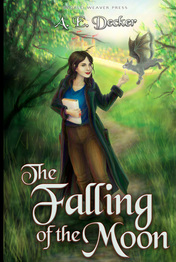 Missed the first book in the Moonfall Mayhem series? The ebook is on sale for only $0.99. Amazon Barnes and Noble Kobo iTunes World Weaver Press "A unique and clever fantasy, The Falling of the Moon is a thoroughly entertaining read from first page to last. Very highly recommended and certain to be an enduring favorite." —Midwest Book Review 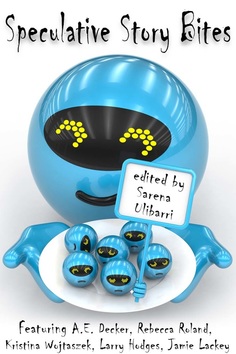 "The Museum of Haunted Objects" by Megan Neumann is original fiction from the anthology Speculative Story Bites. Get the whole anthology from Amazon, Kobo, or World Weaver Press. Ellery rolled his eyes as the family approached the “Boiling Pot,” his most predictable display. As he expected, the kids—a girl with a messy braid and a greasy boy nearing his teens—gasped when the water began to boil. Like all his visitors, this family was predictable, expecting nothing more than a cheap thrill and temporary amusement from his museum. Although, he reminded himself, that’s all his displays were: temporary amusements. He knew he shouldn’t be hateful. He had, after all, collected the displays himself, but he found no excitement in the attractions after forty-seven years. The family moved to the mirror next. The mirror, he knew, would make them shriek. Ellery waited for their reaction, but he tried to appear as if he wasn’t watching them. He focused on writing in his logbook with his fine fountain pen, adding detailed descriptions of the family as he watched. He did this with all his visitors. Mundane, lower-middle class family. Cheap shoes, he wrote in his neat script. Then he heard the scream. It was the mom. She let out a high-pitched yelp. Then the whole family laughed nervously. They slowly scooted away from the hanging piece of glass. The woman in the mirror, Lavinia was her name, ran toward the family as though running down a long hallway. She never reached the end, however. She ran and wept for eternity. Such was the nature of this haunted mirror—repetitive and lifeless. Ellery sighed and stared at his logbook without writing. He hoped he wouldn’t have to fret over this much longer. He had put out an ad three days earlier: Wanted: Curator needed for museum of haunted objects. Pays little, but little work required. Must not startle easily. No one had applied yet, which surprised Ellery. Fifty years ago he would have jumped at the chance to work in such a place. He had, in fact, responded to such an ad posted by his predecessor nearly fifty years ago. At that time, a disgruntled old man had explained to a young Ellery that he would maintain the museum and acquire new haunted objects. For his efforts he’d receive a small salary and a place to live above the museum. His salary came from the anonymous owner whom Ellery had never met. But fifty years ago Ellery had been stupid, naïve. He hoped someone even stupider would show up to take his place behind the front desk and pass their days in monotony. “Look at them go,” the boy said, interrupting Ellery’s thoughts. They were watching the marching boots. Ellery’s nose wrinkled in disgust. “There’s not any legs,” the girl said dumbly. Ellery coughed as he wrote the girl’s idiotic comment in his logbook, noting she probably inherited her intelligence from her dull-eyed father. The family moved into the room of “Asian Wonders” where he could no longer see or hear their reactions. But he didn’t need to see or hear to know how they would react. They would look away from the petrified root, which writhed in its case like a newborn infant in a crib, its tuberous growths resembling a child’s face and limbs. Then they would gaze in awe at the China doll that danced in a small circle, smiling mysteriously and beckoning onlookers to come closer. He harrumphed and closed his logbook. There would probably be only one guest entry today, perhaps only one entry this week. Ellery prepared to return to his office for a cup of tea when he heard faint thumps of footsteps. The sound did not come from the marching boots but from the front of the museum. “Hello,” said a male voice, “I’m inquiring about the advertisement.” The voice was smooth, a young man’s voice. Though when Ellery looked up, he found an awkward not-so-young man standing in the doorway wearing suspenders over a stained white button up shirt with a green bowtie. One of the man’s eyes was larger than the other. The larger of the two twitched almost rhythmically. His thick lips were pulled into a smile revealing two rows of square teeth. “This is the Museum of Haunted Objects, correct?” the man asked. Ellery cleared his throat and tucked his logbook under his desk. “What else could this place be?” Ellery asked. He waved a hand at the rows of objects, thumping noisily on their display tables. The man smiled again. “Of course,” he said. “Of course, this is the museum.” “So you want the job, eh?” Ellery stepped from behind the desk and approached the man. “You think you have what it takes?” “The ad said the work wouldn’t be hard.” “Hmph,” Ellery said. “Maybe not physically, but you must be prepared to maintain each object, understand each spirit’s idiosyncrasies.” Ellery paused dramatically, or so he hoped, but the man’s expression did not change. “Your name?” Ellery asked.
One of the anthology authors put it perfectly upon seeing the TALES OF KRAMPUS cover art for the first time: "What a thing of beastly beauty!" We're thrilled to show off the cover for Kate Wolford's new anthology, HE SEES YOU WHEN HE'S CREEPIN': TALES OF KRAMPUS, forthcoming November 22, 2016. Original illustration by Samuel Connor Anderson (who also did the cover illustrations for FROZEN FAIRY TALES and KRAMPUSNACHT).
Krampus is the cloven-hoofed, curly-horned, and long-tongued dark companion of St. Nick. Sometimes a hero, sometimes a villain, within these pages, he’s always more than just a sidekick. You’ll meet manifestations of Santa’s dark servant as he goes toe-to-toe with a bratty Cinderella, a guitar-slinging girl hero, a coffee shop-owning hipster, and sometimes even St. Nick himself. Whether you want a dash of horror or a hint of joy and redemption, these 12 new tales of Krampus will help you gear up for the most “wonderful” time of the year.
Pre-order:
Ebook Amazon Kindle (US) Amazon Kindle (UK) Amazon Kindle (Canada) Barnes and Noble iTunes World Weaver Press Online Store (P.S. Ebook price will increase after release day, so snag it now!) Trade Paperback World Weaver Press Online Store (Paperback will be available via Amazon on November 22, 2016) About the Anthologist
Kate Wolford is a writer, editor, and blogger living in the Midwest. Fairy tales are her specialty. Previous books include Beyond the Glass Slipper: Ten Neglected Fairy Tales to Fall in Love With, Krampusnacht: Twelve Nights of Krampus, and Frozen Fairy Tales, all published by World Weaver Press. She maintains a 'zine, Enchanted Conversation: A Fairy Tale Magazine, at fairytalemagazine.com.
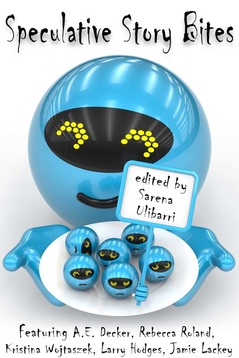 "John Knocking" by Kristina Wojtaszek is original fiction from the anthology Speculative Story Bites. Get the whole anthology from Amazon, Kobo, or World Weaver Press. He shuddered as the scalpel nicked a rib, flaking off a shell-white sliver. For a moment, John was unable to go on, his hands falling limp to his sides. He remembered a time when he’d enjoyed the intimate music a body produced on his table; the metronome of blood dripping to the floor, the whispering shush of a heart releasing its last fistful of life, the grunts of the slavish intestines, working long shifts even as the skin grew dusky and the muscles seized. But bone was an instrument that never failed to unnerve him, and the sharp crack as he spread apart her ribs sent him stumbling out the door into the back alley, gulping twilight. For the thousandth time, he wondered what the hell he was doing. It was some thirty years ago that John acquired his first patient; a squirrel his brother had shot out of a tree with his prized BB gun. Five year old John lifted the limp body, amazed by the little heart still thrumming away under his thumb. His brother watched in silence as John snuck the rodent into the house, making a bed for it in his underwear drawer. They checked on it later that night, but found its limbs stuck straight out like the stiff legs of a chair. Eric shrugged and slunk away to his bed, looking a little guilty. But death didn’t deter John, always the obstinate and unswayable child. His relentless will often resulted in long hours seated before cold pork chops, and once, a screaming fit as his mother yanked him out of a hole in the back yard and carried him off to bed, resigning herself to nonfictional bedtime stories from then on. The next morning, he’d had to rescue A Journey to the Center of the Earth from the kitchen trash. So as his brother snored that night, John lay sprawled on the bedroom floor, digging for life with a pen knife. He uncovered the ribs first, like the miniature doors of an iron gate, painted sterling by the moonlight. He pried them open with his thick thumbs, one still bearing the indent from his nightly sucking. As he poked his way through the pericardium, like the thin skin of a pea, he found the now quiet heart and pried it loose. He held it up in his palm, searching for some miniscule screw or latch, any indication of where a tiny battery might be replaced. At last he gave up, setting the heart between the little pink lungs, like wads of chewing gum. He poked at them, moving one aside; behind it, he spied a blood-red door. “Jesus, kid, what are you doing?” his brother whisper-shouted, waking as John made a noise of surprise. For the first time, John noticed the blood spotting the floorboards and staining his white nightshirt, appearing black in the dark room. He glanced back at the tiny door, nestled in the squirrel’s chest, the spine like a long white stair trailing down from it. Suddenly, John was scared of what he’d done, seeing the panic in Eric’s wide eyes. “Don’t tell Mom.” Eric was something of a devil, their mother always said, telling John the cat food was a bowl of tiny cookies, the toilet a portal to the ocean, which you had to dive into head first, and declaring with certainty that the spider plants in the living room were strong enough to swing from. But for all his cruel pranks, Eric was a saint that night. He helped John undress, mopping up the blood with his shirt and stuffing the mess into an old game box he promised to throw out the next morning. He got his kid brother a soapy washcloth and a clean set of pajamas, and hid the pen knife under his own bed. “What about the squirrel,” John whined. “What about it? It’s dead. We’ll bury it tomorrow; pretend the box is a coffin.” But John lay awake for a long time after, and when he finally slept, he found himself standing before that dark little door in his dreams, his hand poised to knock. Two years after the squirrel dissection, John found himself suddenly alone with the body of a stray tabby. Eric was at a friend’s house, and John had spent the morning on his knees by the road, scraping at a lost marble embedded in the cement, when the sound of screaming tires brought him to his feet. A man stuck his head out the window of a black Riviera, asking if John was all right. He nodded, never taking his eyes off the lifeless ball of fur between the car’s rear tires. The man handed him a wad of twenties, assuming the cat had been John’s, and left him in the wake of another life lost. This time, John knew immediately that the cat was gone by the snapped bone protruding from its neck. He wasted no time stuffing it into an old shoebox and taking off to the woods behind their house. He remembered Eric’s help that fatal night two years before, and brought a backpack with a clean set of clothes, two trash bags, his mother’s rubber gloves she used for bleaching the countertops, an X-Acto, and an old hand towel that had made its way to the rag bin. He set out his supplies beside the tiny pond where he and Eric fished for tadpoles. He hesitated only for a moment, wishing for a pair of scissors or a razor, before carving into the chest. It took longer to open than the squirrel’s had, and when he pulled apart the ribs they snapped like a broken branch, and his hands slipped in the blood, causing him to fall over the body, his face inches from the gore. John had to gaze off into the trees for a while, finding relief in their still limbs and sealed, knotted eyes as he fought against the rise of nausea. The afternoon light had grown dull and morose by the time John had the heart and lungs out, nestled together in the open trash bag. He tipped the body to drain the blood-filled cavity, and a glint of glass caught his eye. He wiped at it with the rag, revealing a tiny oval window with an intricate lead design set high in a black door, about the size of a wallet. It looked as though it belonged to a dollhouse, but there was no knob or lock, no keyhole or bolt or any indication that the door could be opened, and yet it was well-formed and finely detailed, sitting in a frame of flesh. John tapped at it with a knuckle, testing its wooden ring, like the echo of a lost heartbeat. He pried at the seams with his blade, but it snapped off, leaving him with little more than a sliver of metal to work with. He turned the cat over, scraping at its back, but there was no sign of the door beneath those muscles. Later he would learn their names, trapezius and rhomboideus, when a degree in veterinary medicine would become the only feasible route to study his growing obsession. But never would that hidden door be discussed or labeled in his texts, and he would learn to see through it when reciting anatomical terms for an exam. After dinner, when John led Eric by flashlight to the hidden body, Eric stared quizzically at his kid brother as John pointed out the door. “Don’t you see it?” But Eric rapped on John’s backbone as John explained what he saw. Eric shook his head and backed away, looking more than a little disturbed. “I don’t have to worry about you coming at me with a scalpel in the middle of the night, do I?” Eric asked with a forced laugh. But that night, it was John who was startled awake, a voice drawing him out of his dreams. He held his breath as he lay still, popping his thumb into his mouth before remembering the blood that had made its way earlier through a small tear in his mother’s glove. The thick chop of the clock in the hall was finally easing him back to sleep when he heard it again: a too-close, sinister whisper. John moaned as he wet the bed, his eyes scanning for movement in the dark, but there was nothing to see. The words kept coming, slow and clear as his own thoughts. I smell my blood on you. His scream wouldn’t come. He longed for Eric, for his mom, thinking of the doors between them… Suddenly John understood, remembering the little black door inside the tabby. He had knocked, and the cat had answered. *** 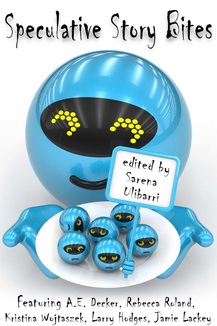 "The Business of Thorns" by Shannon Phillips is original fiction from the anthology Speculative Story Bites. Get the whole anthology from Amazon, Kobo, or World Weaver Press. So, flower fairies, yeah. Cicely Mary Barker drew us as little nymphets with buttercup hats and dragonfly wings, having tea parties with mice or some twee shit like that. I think Cicely knew Morning Glory, and Glory’s always been fanciful. Her seeds are laced with a psychedelic compound, you know—and not one that’s particularly friendly to humans that go chasing that high. Neural damage, convulsions: Cicely was epileptic. I’m not slamming Glory, though. We’re the same type, her and me: wild, rambling, greedy for life. We take root anywhere and we’re damn hard to kill. Like this one time-- It was St. Louis, 2014. I’d been up all night drinking moonshine with a bunch of teenage witches and I had a wicked fucking hangover. I pulled my Che Guevara cap down low to shade my eyes and shouldered my way into McGurk’s. Early afternoon, midsummer’s day, the place was quiet and dim. It would get packed towards evening, when the band started playing and the college students showed up, but for now it was a refuge. I spotted someone I knew and nodded to her as I made my way to the bar. “Yo, Ivy.” “Blackberry,” she mumbled into her pint. She didn’t look any better than I felt, but then, Poison Ivy rarely did. Bumps and rashes all over her pallid skin—she didn’t have to wear it like that, but she did it as a kindness. Kept the mortals from brushing against her. Me, I’m not showy. I can clean up real pretty when I feel like it, but that’s not often. I’d settled into the form of a tall, rangy twentysomething with glossy black skin, sloe eyes, and full, berry-kissed lips, but mostly I hid it under brimmed caps and slouchy cargo pants. My come-hither/fuck-off schtick: it’s how I do me. Don’t be picturing the wings, though. It takes a certain kind of person to see the wings—the younger the better—and most of the time, if they can’t be seen, then they’re not even there. Circular fuckin’ fairy logic. “What’s the sitch?” I asked Ivy as I settled in across from her with a glass of bitters. I know my slang is out of date, but I do the best I can, all things considered. Plants aren’t great at snappy repartee. Ivy shrugged and hunched over her Guinness. “Haven’t seen you much,” she said. “Lately.” “Found a bunch of girls,” I said. “They go under a bluff to do spells, Ouija board shit. Half believe in it, you know. Enough to see me, sometimes. Another year, they’ll think I was just a story they made up.” “Little girls,” Ivy said, the jealousy raw in her voice. I made a little dismissive motion with my hand. “We’re not talking about the Cottingley cousins here,” I said. “They skip school, swipe hooch, light some candles under the bluff. They’re drunken Hoosier witches. One of ‘em will get herself knocked up within the year and then it’ll all be over.” But I only said that because I didn’t like the avarice smoldering in Ivy’s eyes. I loved those girls. They were poor, yes, but they had fire and grit and secret, splendid dreams, and when they left me (which they would, I wasn’t lying about that part) they would carry my blessing with them. “Lucky,” Ivy said. I took a pull of my drink and looked away. I couldn’t deny it. Underneath the hangover I was still buzzing from the night before. To be seen—really seen—by a mortal: it’s a rush, it’s the kind of hit that can keep us going for years. Ivy moved her glass, dragged a finger through the ring of wetness left behind, and muttered something I didn’t catch. “What was that?” “Careful,” she said, still mumbling. “Careful of them.” I nodded, but she wasn’t done. “Last one I had who could really see me, he died,” she said. “Anaphylactic shock.” Her eyes were fixed on the table. “Oh, Ivy,” I breathed. She looked up then, green eyes startlingly clear in that ravaged face. “I never touched him,” she said flatly. “And I heard Clover lost one the same way.” “Why didn’t you tell me?” Ivy’s mouth twisted. “What would you have done? Nothing to be done.” “Bullshit,” I said. “Someone, some thing, fucking with us? With our kids? I will damn well do something about it.” “What, you’re some kind of detective now? The crime-fightin’ flower fairy, is that right? Gum shoes and butterfly wings?” “Fuck right off with that,” I said, but gently. “You know, you know, if this is happening, it’s only happening to the weedy types. Fuckin’ Hydrangea isn’t dealing with this shit.” “You could ask Rose,” Ivy said. “No.” Ivy looked down at the table again. “No,” I said, more strongly. “You two were close once.” She’d gone back to mumbling. “Don’t talk about Rose to me. Don’t talk about what she was to me. Cultivated little bitch.” “But she has more,” Ivy said softly. “More human children than any of the rest of us. If there’s a pattern…she’d see it.” “Sheeyit,” I said, and drained my glass in one long swallow. And then I made Ivy tell me everything about that kid who’d died. I left McGurk’s thinking about Rose. Petals like white snow; black berries and black wings; a crush of juice like wine, or blood. These are my elements, and for whatever reason they are elements that I also share with Rose. Blood, snow, ravens, thorns. Above all, she and I share the business of thorns. You never have to walk far to find roses. They’re fucking ubiquitous. I just kept going until I found a pot of straggly climbers somebody had left on a brick stoop. Then I wrapped my hand around the stems and squeezed until I felt the sharp pain, my palm pierced in a half-dozen places. “Rose,” I said aloud. “We need to talk. Three o’clock, Shaw’s garden.” My skin healed as soon as I let go of the thorns. I swiped my hand against my pants to brush away the blood, and shambled on down the sidewalk, scuffing my combat boots with every step. Gum shoes and butterfly wings. Or maybe I should style myself Flower Fairy PD—homicide division. ***  Fall is my favorite season. Here in New Mexico, it means the International Balloon Fiesta, green chile roasting, piñon picking, and the annual burning of Zozobra (Old Man Gloom). It's also, of course, the season of Halloween, and Dia de los Muertos, and the leaves changing and falling. As the days grow colder and darker, our thoughts often turn darker as well, the contemplation of our own mortality balanced by the revelry of costumes and harvest and festivals. It's a great time to return to those classic Gothic novels, or to take your own writing to the dark places you've been avoiding all year. Has it really been seven months since I took over as Editor-in-Chief? We've brought our seven books in as many months, with two more coming soon, and a full slate planned for 2017 (and yes, open submissions, too). I planned to return to one of those recent books in these darker days. In its original conception, my anthology Speculative Story Bites was supposed to be a followup to Specter Spectacular: 13 Ghostly Tales. Speculative Story Bites is published as an ebook, and for the next few months I will be posting approximately one story per week from it here on the WWP blog, starting with the fun "fairy noir" story by Shannon Phillips, and following up with some of the darker, more Halloween-like stories. Check the blog each Friday for a new story, or grab the whole collection for your Kindle or Kobo. We have a lot of books that make great #OctoberReads. For the whole month of October, we're donating to the American Red Cross for each copy of Bite Somebody by Sara Dobie Bauer that sells from any vendor, including our table at the Imaginarium Convention, where you also might be able to get Sara to bite—er, I mean sign—your book. There's also Rhonda Parrish's anthology Scarecrow, which re-imagines the autumn straw-man in a variety of fantasy, science fiction, and horror milieus, and Laura Harvey's anthology Demons, Imps, and Incubi, if you like some sexy along with your scary. In the next couple of months, keep an eye out for the next installment in A.E. Decker's satirical fantasy series (this one parodies Gothic Lit tropes, and is just as wonderful as the first), a new Krampus anthology from Kate Wolford, the long awaited second book in Michelle Lowery Combs' Genie Chronicles series, and some exciting cover reveals and announcements about brand new series by Cheryl Low and K. Bird Lincoln. We're also taking submissions for Rhonda Parrish's Equus anthology, and will be announcing submission details soon for a new humorous fantasy anthology from Trysh Thompson. Whether you follow us on social media, subscribe to our newsletter, or just stumble across our site now and then, thank you for supporting small press. You are the community that keeps us going, especially during the dark, strange days. 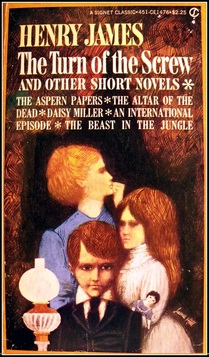 Guest Post by A.E. Decker If history is written by the winners, the winners in literature are the characters allowed to tell a story from their point of view. The Meddlers of Moonshine, the second book in the Moonfall Mayhem series, is due out later this month. Its imminent publication is making me think of the story that provided the strongest inspiration for it: Henry James’ The Turn of the Screw. The Turn of the Screw is the only story I’ve ever read that has unsettled me. You have to keep in mind that I’m the type of person who claps her hands when Montresor bricks Fortunato up in the vault in Poe’s “The Cask of Amontillado.” I’m weird like that. But even though The Turn of the Screw and “The Cask of Amontillado” feature unreliable narrators, Montresor never erases Fortunato’s voice. Every line of dialogue Fortunato speaks is recorded, allowing us to draw our own opinions of his character. In contrast, the governess in The Turn of the Screw never quotes the exact words of her charges, Milo and Flora, until the novella is halfway finished and she herself is already convinced that they’re communing with evil spirits. Of course, we the readers cannot be allowed a perspective other than the governess’ in The Turn of the Screw. A glimpse inside the mind of any of the other characters would instantly dispel the central mystery of whether the ghosts are real or a product of the governess’ delusion and spoil the effect of the story. So we’re left wondering: is the governess a good woman combating the forces of evil, or are these two children, already isolated and possibly abused, at the mercy of a crazed person determined to think the worst of them? To me, the latter proposition is far more terrifying than any ghost, and it was this interpretation which produced the central story in The Meddlers of Moonshine. There’s a scene early in The Turn of the Screw that cemented my opinion of the governess’ character. It’s quite early on, and on first reading, innocuous. The governess and her confidant, housekeeper Mrs. Grose, are discussing Milo. Flora is present in the room with them, eating dinner. The housekeeper has set her in a highchair, tied a bib around her neck, and given her a meal of bread and milk. Flora is eight years old. Now, I’m quite aware that the Victorian ideas of child-rearing were quite different from our modern day ones, but I’ve read other Victorian books and never encountered a scene so infantilizing to a child quite old enough to sit in a normal-sized chair and eat proper food with a napkin. Flora is not allowed to speak, of course, even when the governess and Mrs. Grose are discussing her. The scene has always reminded me of a child playing with a doll. The governess’ first meeting with Milo is remarkably similar. She comments gushingly on his appearance, but gives us none of his words or thoughts. Only when the children start behaving in a way she deems “improper” or “deceitful” does she report their words, and even then, we get the sense they have passed through the filter of her judgment. Toys are not meant to misbehave. That’s the real horror, to me; being under the complete control of a person who sees you as an object. True evil, as the immortal Terry Pratchett once wrote, starts with people viewing other people as things. 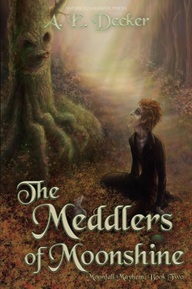 Authors have ways of getting their own back. My disquiet with The Turn of the Screw, and my interpretation that the priggish, self-righteous and delusional governess had tormented a pair of already tormented children — one to death — inspired me to turn my own screw, in a sense. I knew that one of the books in the Moonfall Mayhem series would parody the tropes found in Gothic fiction. I also knew that each of Ascot’s companions would be given a chance to share a book’s perspective with her in turn. Rags-n-Bones is easily the meekest and most innocent of Ascot’s companions, and since one of Gothic literature's main themes is of innocence confronting depravity, it seemed appropriate that this story was his to be told — in his own words. And, to balance the scales, I gave Milo and Flora their voices in the form of Kay and Lindsay Ashuren. Their backgrounds are not identical, but if there is a place where characters from books meet, such as in the works of Jasper Fforde, I like to think they’d recognize one another. There’s a touch of Frankenstein in Meddlers, too, and a trace of good old Dracula. But funnier. Rest assured; much funnier. I’ve made my peace with The Turn of the Screw now. I still love the story, even as it makes my flesh creep. Perhaps one day, I’ll even revisit it and sympathize with the governess, in which case, I’ll have to write another book exonerating her. Just don’t hold your breath. 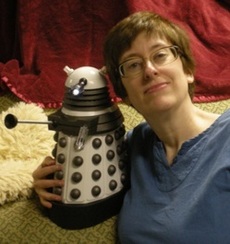 A. E. Decker hails from Pennsylvania. A former doll-maker and ESL tutor, she earned a master’s degree in history, where she developed a love of turning old stories upside-down to see what fell out of them. This led in turn to the writing of her YA novel, The Falling of the Moon. A graduate of Odyssey 2011, her short fiction has appeared in such venues as Beneath Ceaseless Skies, Fireside Magazine, and in World Weaver Press’s own Specter Spectacular. Like all writers, she is owned by three cats. Come visit her, her cats, and her fur Daleks at wordsmeetworld.com. |
World Weaver PressPublishing fantasy, paranormal, and science fiction. Archives
February 2024
|
- Home
-
Books
-
All Books
>
- Beyond the Glass Slipper
- Bite Somebody
- Bite Somebody Else
- Black Pearl Dreaming
- Cassandra Complex
- Causality Loop
- Clockwork, Curses, and Coal
- Continuum
- Corvidae
- Cursed: Wickedly Fun Stories
- Dream Eater
- Equus
- Fae
- Falling of the Moon
- Far Orbit
- Far Orbit Apogee
- Fractured Days
- Frozen Fairy Tales
- Glass and Gardens: Solarpunk Summers
- Glass and Gardens: Solarpunk Winters
- Grandmother Paradox
- Grimm, Grit, and Gasoline
- Haunted Housewives
- Heir to the Lamp
- He Sees You When He's Creepin': Tales of Krampus
- Into the Moonless Night
- Jack Jetstark's Intergalactic Freakshow
- King of Ash and Bones (ebook)
- Krampusnacht
- Last Dream of Her Mortal Soul
- Meddlers of Moonshine
- Mothers of Enchantment
- Mrs Claus
- Multispecies Cities
- Murder in the Generative Kitchen
- Recognize Fascism
- Scarecrow
- Sirens
- Shards of History
- Shattered Fates
- Skull and Pestle
- Solarpunk (Translation)
- Solarpunk Creatures
- Solomon's Bell
- SonofaWitch!
- Speculative Story Bites
- Trenchcoats, Towers, and Trolls
- Weredog Whisperer
- Wolves and Witches
- Anthologies and Collections
- Novels
- Novellas
- Fairy Tale
- Fantasy
- Romance
- Science Fiction
- Urban/Contemporary Fantasy
- Young Adult SFF
-
All Books
>
- Blog
- About
- Contact
- Press / Publicity
- Newsletter Signup
- Privacy Policy
- Store

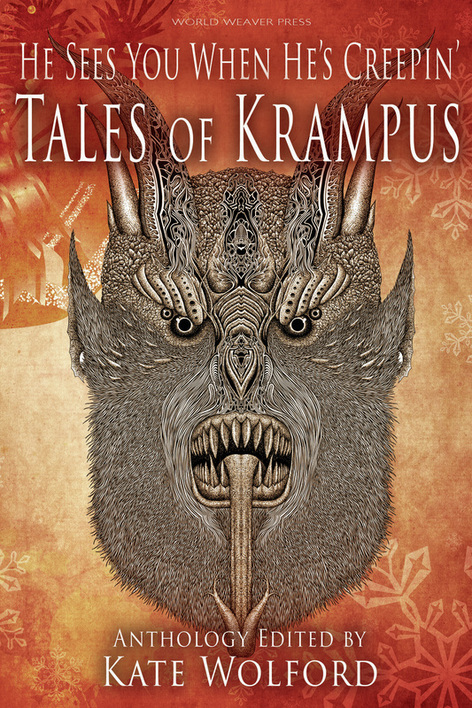

 RSS Feed
RSS Feed